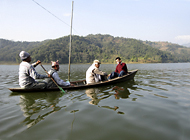Economics of Climate Change Adaptation in Rupa Lake Watershed in Nepal: Stakeholder Focused Approach


Image: rcse.edu.shiga-u.ac.jp
Livelihoods of a watershed people are highly interlinked. If the climate change effect appears in the watershed, it affects the whole livelihood system of the people of that area. Hence, costs and benefits of any adaptation interventions are also common among the stakeholders. This study analyses the issues of adaptation in Rupa watershed, identifies potential needs and benefits including mechanism for sharing of cost and benefits among different stakeholders using the stakeholders focused approach (SFA). Livelihoods of the residents of this watershed area are based on agriculture , which is likely to suffer from extreme weather condition of heavy rainfall, landslide, and increased siltation. Besides that downstream communities of the lake are also earning from fisheries in the lake through local cooperatives and also sharing the benefits to the upstream communities of the lake. This paper also analyses the monetized and non-monetized cost and benefits of adaptation during extreme weather condition and recommendation for project specific investment/cost sharing and responsibility. It also analyses the social, economic and ecological impacts of these adaptation measures. Beyond financing, this also provides the guidelines to the local level planning and role of communication among the stakeholders for trade-off and prioritizing adaptation actions.
(0) Comments
There is no content